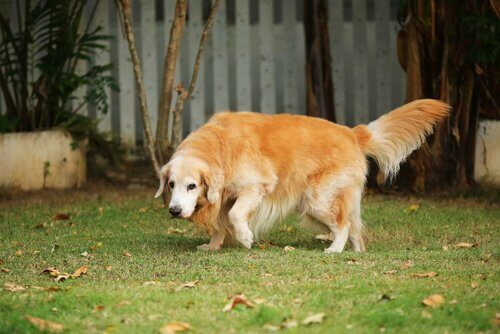Old Dogs CAN Learn New Tricks!

While it’s true that people mostly take puppies to training classes for them to learn, old dogs can learn new tricks too! A recent study has even shown that older animals have better cognitive skills than young ones. Find out more about older dogs in this article.
Old dogs: Yes, they CAN learn!

There’s a very popular phrase among pet owners: You can’t teach an old dog new tricks. However, that’s not true. Yes, time can diminish a dog’s ability to learn, remember, or reason but there’s a huge difference between that and not being able to learn anything at all.
A group of researchers from the University of Vienna analyzed the cognitive abilities of Border Collies. People consider them to be the smartest dogs. The dogs in the trial were between 5 months and 13 years old. Using touch screens, researchers trained the dogs to complete different tests related to memory, logical reasoning, and learning.
The results have been really surprising. “Older dogs needed more tries before solving a problem, compared to puppies, and their thinking was less flexible,” said Lisa Wallis, the lead author of the study. Like people, older dogs find it more difficult to change their old habits, and everything they have learned in their lives.
However, the older dogs showed better logical reasoning. Friederike Range, the co-author of the study, explained that the older the animals were, the better they performed in this activity. Puppies and young dogs were unable to master the task. For Range, the reason was that older dogs are more stubborn about what they learn, and are therefore less flexible.
In terms of long-term memory, there were no significant differences between the different ages. The memorization test was repeated 6 months later, and almost all the dogs remembered the images.
With this study, researchers hope to learn more about the aging process of pets, and treat cognitive illnesses in advance.
How to teach older dogs

Now that we know that age isn’t an impediment for your pet to learn new things, we’ll give you some tips for teaching the basics. They’ll be very useful if you adopt a stray adult dog or senior dog.
- Don’t underestimate a dog’s abilities just because it’s not a puppy
- A senior or adult dog also needs patience and time to learn
- Offer him a treat or food that he likes each time he learns something new
- Pick a quiet place without distractions for lesson time
- Start with short “classes” that last 20 minutes a day
- Remember that he might need more time than a younger dog, but he’ll learn sooner or later
- Don’t scold or punish your dog if he doesn’t understand something
- Be patient, and don’t forget that senior dogs are like grandparents
- Don’t use choking collars or similar objects to teach him
- Research the correct type of training for your dog’s breed
- Consult a professional senior dog trainer
- Start with basic commands like sit, stay, or shake
- Take advantage of the dog’s previous knowledge or habits
- Keep in mind that an old dog may have health conditions or disabilities that are typical for dogs his age
- Get to know him, and observe when he’s tired, nervous, or happy to learn
- Give him simple commands that he can learn without problems
- Congratulate him every time he does what he should
While it’s true that people mostly take puppies to training classes for them to learn, old dogs can learn new tricks too! A recent study has even shown that older animals have better cognitive skills than young ones. Find out more about older dogs in this article.
Old dogs: Yes, they CAN learn!

There’s a very popular phrase among pet owners: You can’t teach an old dog new tricks. However, that’s not true. Yes, time can diminish a dog’s ability to learn, remember, or reason but there’s a huge difference between that and not being able to learn anything at all.
A group of researchers from the University of Vienna analyzed the cognitive abilities of Border Collies. People consider them to be the smartest dogs. The dogs in the trial were between 5 months and 13 years old. Using touch screens, researchers trained the dogs to complete different tests related to memory, logical reasoning, and learning.
The results have been really surprising. “Older dogs needed more tries before solving a problem, compared to puppies, and their thinking was less flexible,” said Lisa Wallis, the lead author of the study. Like people, older dogs find it more difficult to change their old habits, and everything they have learned in their lives.
However, the older dogs showed better logical reasoning. Friederike Range, the co-author of the study, explained that the older the animals were, the better they performed in this activity. Puppies and young dogs were unable to master the task. For Range, the reason was that older dogs are more stubborn about what they learn, and are therefore less flexible.
In terms of long-term memory, there were no significant differences between the different ages. The memorization test was repeated 6 months later, and almost all the dogs remembered the images.
With this study, researchers hope to learn more about the aging process of pets, and treat cognitive illnesses in advance.
How to teach older dogs

Now that we know that age isn’t an impediment for your pet to learn new things, we’ll give you some tips for teaching the basics. They’ll be very useful if you adopt a stray adult dog or senior dog.
- Don’t underestimate a dog’s abilities just because it’s not a puppy
- A senior or adult dog also needs patience and time to learn
- Offer him a treat or food that he likes each time he learns something new
- Pick a quiet place without distractions for lesson time
- Start with short “classes” that last 20 minutes a day
- Remember that he might need more time than a younger dog, but he’ll learn sooner or later
- Don’t scold or punish your dog if he doesn’t understand something
- Be patient, and don’t forget that senior dogs are like grandparents
- Don’t use choking collars or similar objects to teach him
- Research the correct type of training for your dog’s breed
- Consult a professional senior dog trainer
- Start with basic commands like sit, stay, or shake
- Take advantage of the dog’s previous knowledge or habits
- Keep in mind that an old dog may have health conditions or disabilities that are typical for dogs his age
- Get to know him, and observe when he’s tired, nervous, or happy to learn
- Give him simple commands that he can learn without problems
- Congratulate him every time he does what he should
This text is provided for informational purposes only and does not replace consultation with a professional. If in doubt, consult your specialist.








